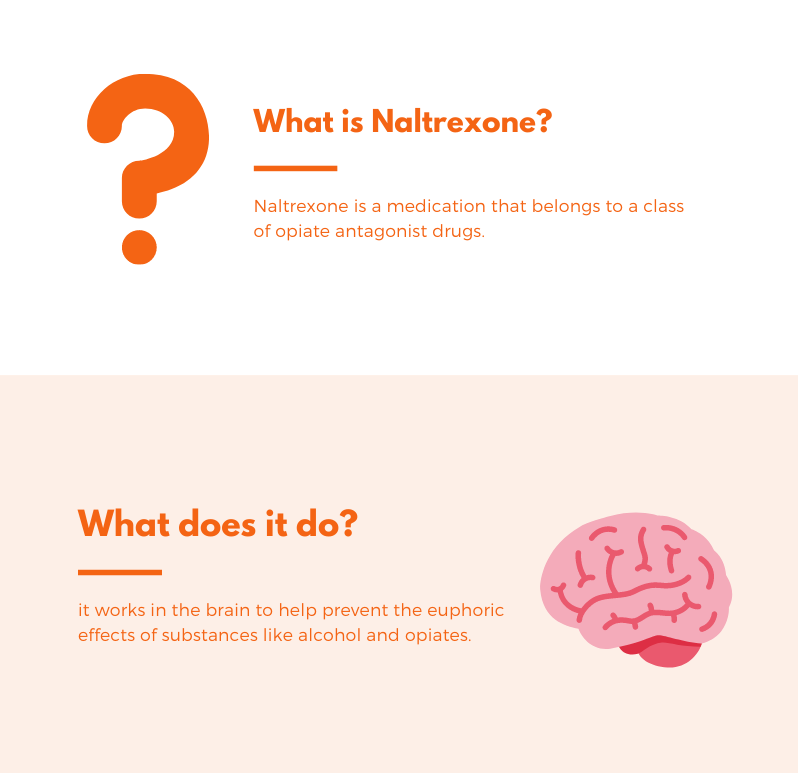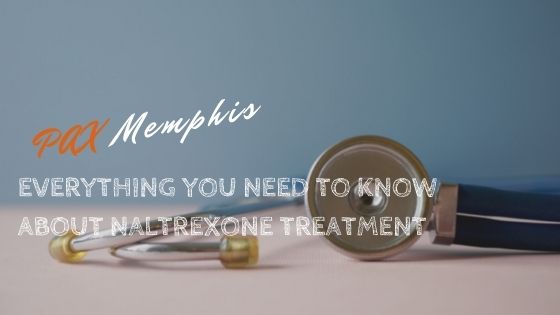Commonly used in the treatment of opioid and alcohol addiction, Naltrexone is a medication approved by the U.S. Food and Drug Administration (FDA) that helps suppress drug and alcohol cravings as well as the motivation to use drugs and alcohol. When used as part of a medication-assisted treatment program, this medication is extremely effective in helping people who are seeking treatment for addiction. Naltrexone treatment programs combine the use of the medication with behavioral therapies and peer support to offer a “whole-patient” approach.
At PAX Memphis, we aim to provide our patients with the best possible individualized care. Since other treatment medications don’t work for everyone, we proudly offer Naltrexone treatment in Memphis, TN. By combining the use of Naltrexone with comprehensive therapy and aftercare, patients have access to all of the tools they need to stay sober.
What is Naltrexone?
Naltrexone (Revia or Vivitrol) is an opiate antagonist medication that works in the brain to prevent the effects of opioids. It is also said to help decrease the desire to take opioids. The medication can come in the form of a daily tablet or a monthly injection, but should not be used until patients have completed the detoxification process. Perhaps the most important thing to know about Naltrexone is that it should always be implemented as part of a complete addiction treatment program.[1]
Substance abuse treatment programs that offer Naltrexone will also offer behavioral therapies, individual and group counseling, lifestyle changes, medication management, and peer support. Since the drug was approved by the FDA in 2006, it has been a leading opioid and alcohol addiction treatment medication.

Naltrexone Treatment for Opioid Dependence and Alcohol Addiction
Naltrexone was initially approved by the FDA for the treatment of opioid addiction. People who take the drug will no longer experience the euphoric effects that come from opioid use, so they are less motivated to relapse and continue their opioid abuse. However, shortly after doctors began using it for opioid dependence, they realized that the medication works in similar ways for alcoholics.
The exact reason why Naltrexone treats alcoholism is still unclear, however, the brain interacts with opioids in a similar way that it does with alcohol, so it makes sense that the drug can suppress the pleasurable sensations that come from drinking. Similar to recovering opioid addicts, alcoholics who are taking naltrexone will no longer feel the euphoric effects from alcohol consumption, so they are less likely to crave alcohol or continue drinking.
Even though Naltrexone is a highly effective form of treatment for opioid and alcohol dependence, it is rarely successful as a sole form of substance abuse treatment. The medication does not reduce the symptoms of alcohol withdrawal nor does it treat the underlying causes of addiction. As a result, Naltrexone is most effective when used in combination with a comprehensive addiction treatment program that consists of additional medications, behavioral therapy, and peer support.
Addiction Treatment With Naltrexone: How it Works
Similar to all other addiction treatment medications, Naltrexone should only be taken under the close supervision of a practicing physician. Even though the drug typically doesn’t interact poorly with alcohol or other drugs, it is only prescribed once a person has stopped using drugs or alcohol and has completed the detox process. In addition, doctors should check the function of a patient’s liver before beginning Naltrexone treatment because if the liver fails to function, the medication won’t be processed correctly in the body.
Sometimes, Naltrexone is only used for a short period of time while patients reside at an inpatient treatment facility. However, experts typically see better outcomes in people who use the medication for three months or more. Compared to other treatment medications, like Suboxone, Subutex, and methadone, Naltrexone is safe and has very little risk for abuse.
Naltrexone comes in two different forms: a pill or an injection. The pill is sold under the brand name Revia and is a tablet that is taken once per day with or without food. In some cases, patients will only need to take the medication every other day. The injection, on the other hand, is known as Vivitrol and is a once-monthly extended-release version of Naltrexone. Vivitrol is best for people who struggle with medication compliance or are looking for a more low-maintenance version of the drug.
Overall, medication-assisted treatment using Naltrexone offers many benefits to people in recovery. According to SAMHSA, the benefits of this type of treatment include:[2]
- Fewer and less severe side effects than other treatments
- Reduces the motivation to drink or use drugs, thereby reducing the risk of relapse
- Helps improve treatment retention rates and overdose rates
- Improves the outcomes of counseling and other recovery methods
- Reduces the risk of HIV or Hepatitis C transmission as well as the risk of illegal behaviors associated with substance abuse
Potential Side Effects of Taking Naltrexone
Like any other medication, Naltrexone treatment doesn’t come without a list of potential side effects. Fortunately, this medication has a long history of medical use so it’s side effects are well-known and documented. Plus, the majority of common side effects are mild and tend to fade over time. Still, it is important to be aware of the potential side effects of Naltrexone.[3]
Some of the most common side effects include:
- Insomnia
- Anxiety
- Headaches
- Nausea
- Vomiting
- Diarrhea
- Abdominal pain
- Aches
- Rash
- Dizziness
- Fatigue
- Constipation
- Ears ringing
The more severe, yet rare, Naltrexone side effects are:
- Liver failure
- Hypersensitivity
- Suicidal thoughts
- Blurred vision
- Shortness of breath
- Hallucinations
- Swelling of extremities or face
If you or someone you know is taking Naltrexone and is experiencing severe side effects, you should speak with your doctor or seek medical attention immediately.
Naltrexone Substance Abuse Treatment in Memphis, TN
Medications are an important part of many drug and alcohol treatment programs. However, it is most important that patients receive the individualized clinical and medical care that they deserve. If you or a loved one are interested in Naltrexone substance abuse treatment, contact an addiction specialist in Memphis, Tennessee today. We’re here to help you find the best rehab program for your needs.
References:
Medically Reviewed: September 25, 2019

All of the information on this page has been reviewed and verified by a certified addiction professional.










